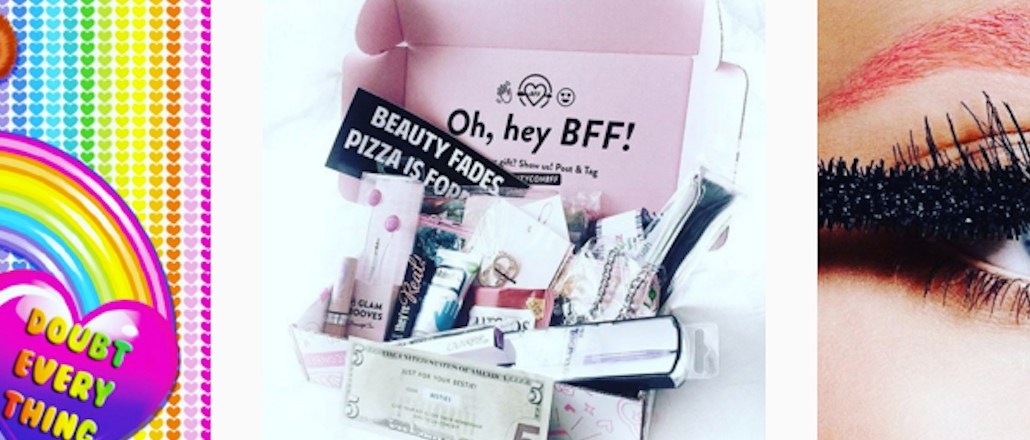Save 50% on a 3-month Digiday+ membership. Ends Dec 5.

Beautycon, an annual beauty festival for brands and Internet celebrities, can be a puzzling scene for outsiders. Over 9,000 beauty fans, most of them teenage girls, crowd booths set up by L’Oreal, Essie and NYX to hoard free samples before frenzy takes over surrounding a session with 19-year-old video blogger Bethany Mota. Fans leave the Q&A in hysterics.
Founded in 2013, Beautycon has built a business around teen beauty-product enthusiasts, makeover tutorials that are popular on YouTube and the social-media celebrities that make them. Founded by serial entrepreneur Moj Mahdara, Beautycon festivals take place in New York, L.A., London and Dallas. The parent company, Beautycon Media, also runs a lifestyle and beauty website.
Now, Beautycon Media is aiming to expand its brand into commerce with a subscription beauty box to keep the fan engagement going outside of the festivals and reach people who can’t make it to the events.
“It’s a way to connect with the community year-round,” Mahdara said at Beautycon NYC, held earlier this month.
The subscription box is called Beautycon BFF. For $99 a year, customers will get four boxes a year, themed around winter, spring, summer and fall. The contents are picked by the celebrities that Beautycon taps for its speaking sessions, with brands contributing to the haul. The first box, released in October, had products chosen by musician JoJo and contained products from Beautycon’s eponymous in-house brand; Benefit; and Maybelline.
“This is following the same route as content to commerce, which can be really powerful,” said Greg Alvo, CEO and co-founder of subscription commerce platform OrderGroove. “You already have a captive audience, and its fans are fanatic, and this gives the company permission to take the relationship to the next level.”
Beautycon isn’t the only company to translate the success of beauty bloggers into physical product. YouTube tutorial queen Michelle Phan launched Ipsy, a monthly subscription company for beauty and hair products, in 2012; it’s now valued at $500 million. Alvo said that Beautycon will have to watch each BFF box release closely to ensure that it’s contributing something of value to its customers, and that they’re not abandoning ship. “If they can leverage their brand and reach, their audience will latch on. They become very loyal,” he said.
Ad position: web_incontent_pos1
To gauge its reach, Beautycon looked at social media conversations surrounding its events. The biggest event, Beautycon L.A., had nearly 300 million impressions on social and a reach of 135 million this year, up from 2013, when it had 15 million impressions and a reach of 7 million. On Facebook, Twitter and Instagram, more than 60,000 posts were shared about Beautycon L.A., with the event’s hashtag trending worldwide during the festival.
Um Yea #BeautyConLA pic.twitter.com/l3Jn8rLHlr
— beilul Behn (@syaksinay) July 28, 2015
Beautycon data showed that reach was driven by YouTube and Instagram stars sharing the hashtag.
“These are real people — they’re more accessible than any other celebrity,” said Mahdara. “So their fans can really connect with them, and it’s a fun way to engage with the box.” Each batch of boxes will include chances to win prizes like a shopping spree with YouTube star Teala Dunn or a birthday tweet from Bethany Mota.
“Since the audience is so active on social media, this can catch conversation, but it has to be valuable,” said Alvo. “It can’t be gimmicky, and it has to differentiate.”
Exclusive Beautycon brand products, full-size products and the social media-celebrity involvement may set the BFF box apart from competitors, like Birchbox and Ipsy. Now, the teenage girls just have to convince their parents to pay the $99 annual subscription fee.
Ad position: web_incontent_pos2
Image via Beautycon/Instagram.
More in Marketing

Ulta, Best Buy and Adidas dominate AI holiday shopping mentions
The brands that are seeing the biggest boost from this shift in consumer behavior are some of the biggest retailers.

U.K. retailer Boots leads brand efforts to invest in ad creative’s data layer
For media dollars to make an impact, brands need ad creative that actually hits. More CMOs are investing in pre- and post-flight measurement.
Ad position: web_bfu
